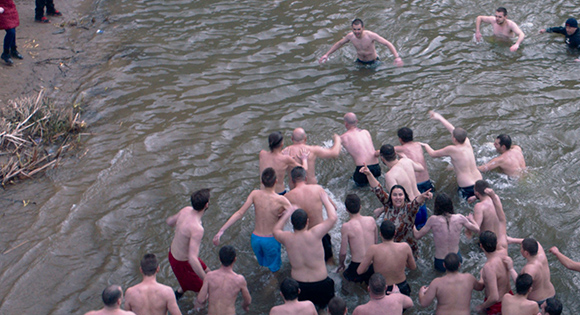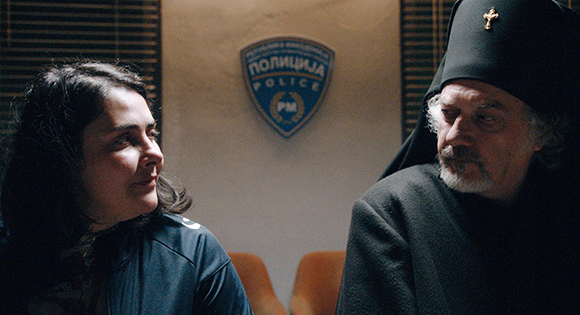The playfully provocative title of Teona Strugar Mitevska’s God Exists, Her Name Is Petrunya isn’t the only patriarchy-smashing trick that this surprising satire has up its sleeve, and the violence of patriarchy is far from the only sacred status quo on its mind. Idols of all kinds are questioned over the course of 100 breezy minutes, and though the film isn’t as theologically curious as its titular phrase suggests, there is plenty of serious spiritual exploration on display throughout. What starts off as an obviously feminist film (complete with an excruciatingly loud and manic opening musical moment) reveals increasingly obscure levels that complicate its character’s motivations in ways that might frustrate those who desire a more obvious and pointed critique. Still, even though the morals of Petrunya’s story can’t be easily packaged into pithy proverbs, the film does what the best parables do, poking at plenty of open-ended questions sure to spark continuing conversation.
In the small city of Štip, Macedonia, 32-year-old Petrunya (Zorica Nusheva), unemployed and disengaged, lives with her concerned parents (Violeta Shapkovska and Petar Mircevski). Her mother is desperate for her to find a job, but Petrunya, equipped with an unusable degree in history and a blankly melancholy stare, seems perfectly comfortable wallowing in her outcast existence.

It seems like a classic setup, one in which an ugly duckling is sure to blossom into the swan she was born to be. But Strugar Mitevska has subtler awakenings planned for her heroine. On her way home from her latest unsuccessful interview, at which she is berated and abused by a misogynistic potential boss, Petrunya happens upon the local church’s annual Epiphany ritual, a contest in which a priest throws a wooden crucifix into the river and eager, shirtless young men scramble to find it in the water, with the winner believed to receive good luck. On a split-second whim, Petrunya dives into the water and snatches the cross, surprising herself and upsetting the city’s delicate societal balance. After absconding with the relic, she eventually finds herself held for questioning inside the local police station, setting the stage for an exploration of the threat of female power to the fragile ego of this male-dominated culture through a series of maddening interactions.
Strugar Mitevska and screenwriter Elma Tataragic have based Petrunya’s outlandish journey in fact. In 2014, at that year’s real-life Epiphany event, a woman in Štip really did catch the cross, causing an uproar. Mitevska and Tataragic expand this seed of a story by pitting a chorus of warring voices against one another, engulfing Petrunya’s spontaneous act in overheated noise and imbuing it with their own disparate meanings. The religious establishment is confused, the brutish group of male participants are enraged, the police department is overwhelmed, and an ambitious news reporter (Labina Mitevska) is hellbent on packaging the moment as a powerful middle finger to men everywhere.

As Petrunya sits quietly in the local police station, these other players circle her, nipping at one another, but never quite succeeding at cracking Petrunya herself. Though some might argue that the film doesn’t succeed at following through on any of the various threads of its setup, the fact that the film stays squarely focused on Petrunya and her stoic stance at the center of the hubbub is one of it’s most subversive strengths.
God Exists, Her Name Is Petrunya could have become a takedown of religious hypocrisy. It could have become an indictment of the violent dangers of misogyny. It could have become a raised-fist-woman-power audience pleaser. Any of these choices could make for thrilling and justice-minded viewing. But God Exists, Her Name Is Petrunya is another animal altogether. It aims for calm complexity over trite triumph. As the fracas around her grows, Petrunya shrinks, softly protecting and even obscuring her own inner life. Despite Nusheva’s consistently intriguing performance, it is consistently difficult to know what Petrunya is truly feeling and desiring; but that seems to be part of the point.
The film’s final moments even include a nod toward a budding romance that frustratingly disrupts the flow of screw-it-all empowerment we wish for Petrunya and clouds the truth of her longings even more. Some might say this is a sign of the film’s punch-pulling weakness, but when viewed in context with the rest of the film and compared to other, more applause-begging films, it’s a sly upending of convention that offers a late, beguiling addition to the film’s buffet of layers.
Like the character of Petrunya herself, God Exists, Her Name Is Petrunya doesn’t seem interested in its audience completely understanding its impulses. It’s a chronicle of a fickle spiritual journey that feels stunningly true to life, complete with starts and stops, disappointments and interruptions, where smooth lines and steady, unbroken hero ascension would be so much more satisfying. The details of Petrunya’s story are as specific as they come, but the film’s main themes are analogous to every existential quest. How might we all find that energizing horizon beyond debilitating self-doubt, that self-possessed place that invites us to embody our inherent birthright as human reflections of the divine? Answering that question is a life’s work, but God Exists, Her Name Is Petrunya suggests that we might start by quieting the cacophony around us and looking deep within.
